Project overview
WSI Pilot Project
The focus of this project was to examine the extent to which the design and operationalisation of the EUSS is digitally inclusive of all EU nationals. The sub-questions explored: i) the extent to which the EUSS digital-only status enhanced the vulnerability of EU nationals and ii) whether the EUSS amounted to indirect discrimination towards EU nationals (Equality Act 2010, ss.9(1) and 19) and/or to a breach of the public sector equality duty (Equality Act 2010, s.149).
The potential digital exclusiveness and the indirect discrimination generated by the scheme were explored along key divides describing EU nationals: age (young-old); rural-urban location, Western-Southern/Eastern Europeans, professional qualifications/occupation. We anticipated that certain categories of EU nationals, such as the elderly, Roma, minors living in care, those living in rural areas or those performing manual labour will be more negatively affected by the EUSS’s reach and digital accessibility. Methodologically, the project drew on policy documents, secondary data (official statistics about EU nationals in the UK) and qualitative semi-structured interviews (25) conducted with key stakeholders. Research participants will include immigration lawyers, local authorities, business groups, the European Commission Delegation in London along with relevant charities/ organisations helping EU nationals, such as the Citizens Advice Bureau, the 3million Group, EU Welcome, New Europeans, Age UK, Public Law Project, and Roma Support Group.
The key outputs included two conference presentations: IMISCOE General Conference (Oslo, 2022) “From citizens to immigrants: spatialities and temporalities of digital governance, exclusion and belonging” (Julie Vullentari), and ECPR General Conference (Prague, 2023) “EUSS: the Challenges of Digital Inclusion and the Rights of Vulnerable EU Nationals” (Iusmen).
The focus of this project was to examine the extent to which the design and operationalisation of the EUSS is digitally inclusive of all EU nationals. The sub-questions explored: i) the extent to which the EUSS digital-only status enhanced the vulnerability of EU nationals and ii) whether the EUSS amounted to indirect discrimination towards EU nationals (Equality Act 2010, ss.9(1) and 19) and/or to a breach of the public sector equality duty (Equality Act 2010, s.149).
The potential digital exclusiveness and the indirect discrimination generated by the scheme were explored along key divides describing EU nationals: age (young-old); rural-urban location, Western-Southern/Eastern Europeans, professional qualifications/occupation. We anticipated that certain categories of EU nationals, such as the elderly, Roma, minors living in care, those living in rural areas or those performing manual labour will be more negatively affected by the EUSS’s reach and digital accessibility. Methodologically, the project drew on policy documents, secondary data (official statistics about EU nationals in the UK) and qualitative semi-structured interviews (25) conducted with key stakeholders. Research participants will include immigration lawyers, local authorities, business groups, the European Commission Delegation in London along with relevant charities/ organisations helping EU nationals, such as the Citizens Advice Bureau, the 3million Group, EU Welcome, New Europeans, Age UK, Public Law Project, and Roma Support Group.
The key outputs included two conference presentations: IMISCOE General Conference (Oslo, 2022) “From citizens to immigrants: spatialities and temporalities of digital governance, exclusion and belonging” (Julie Vullentari), and ECPR General Conference (Prague, 2023) “EUSS: the Challenges of Digital Inclusion and the Rights of Vulnerable EU Nationals” (Iusmen).

